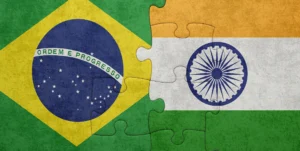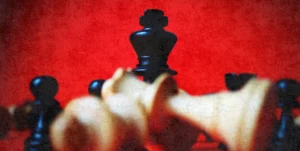In theory, the strategy is brilliant—it assumes an easily shaken opponent. But Trump insisted on playing it on a board that no longer exists. While the U.S. struggles with mediocre growth (2%–2.5% annually since 2017), China moves forward at 5%–6% despite absurd 145% tariffs. The dollar, once the ultimate weapon, is losing ground to China’s CIPS (Cross-Border Interbank Payment System)—which cuts international transactions from days to minutes—and to the 𝐁𝐑𝐈𝐂𝐒 common currency. U.S. big tech firms, once pillars of its economic dominance, are bleeding billions in market value:
- 𝐍𝐯𝐢𝐝𝐢𝐚 (𝐍𝐕𝐃𝐀): –$589 billion
- 𝐌𝐢𝐜𝐫𝐨𝐬𝐨𝐟𝐭 (𝐌𝐒𝐅𝐓): –$71 billion
- 𝐀𝐥𝐩𝐡𝐚𝐛𝐞𝐭 (𝐆𝐎𝐎𝐆𝐋): –$101 billion
- 𝐓𝐞𝐬𝐥𝐚 (𝐓𝐒𝐋𝐀): –$30 billion (Source: Elos Avta Consulting, Jan/2025)
𝑀𝑒𝑎𝑛𝑤ℎ𝑖𝑙𝑒, 𝑇𝑟𝑢𝑚𝑝 𝑙𝑎𝑠ℎ𝑒𝑠 𝑜𝑢𝑡 𝑎𝑡 𝑢𝑛𝑖𝑣𝑒𝑟𝑠𝑖𝑡𝑖𝑒𝑠, 𝑡ℎ𝑟𝑒𝑎𝑡𝑒𝑛𝑠 𝑡ℎ𝑒 𝐹𝑒𝑑𝑒𝑟𝑎𝑙 𝑅𝑒𝑠𝑒𝑟𝑣𝑒, 𝑎𝑛𝑑 𝑖𝑔𝑛𝑜𝑟𝑒𝑠 𝑡ℎ𝑒 𝑜𝑏𝑣𝑖𝑜𝑢𝑠: 𝑡ℎ𝑒 𝑑𝑜𝑙𝑙𝑎𝑟 𝑒𝑚𝑝𝑖𝑟𝑒 𝑖𝑠 𝑐𝑟𝑎𝑐𝑘𝑖𝑛𝑔.
The Washington Consensus—which in the 1990s sold democracy in exchange for economic dependence—is now a museum piece. China not only resists sanctions but laughs at them, while the U.S. watches its own industry wither. 𝐒𝐖𝐈𝐅𝐓, the financial messaging system that once underpinned Western dominance, is now challenged by faster, politically immune Chinese infrastructure.
Trump, in his caricature as a geopolitical cowboy, seems stuck in time. His brinkmanship no longer scares Beijing, doesn’t persuade the 𝐁𝐑𝐈𝐂𝐒, and certainly doesn’t stop America’s relative decline. So the question remains: what cards does Washington still hold? Nuclear threats sound more like the outcry of an empire that no longer writes the rules.
Trump’s brinkmanship is like a poker player who keeps betting big—except everyone already knows his deck is rigged. While China pushes forward with 𝐂𝐈𝐏𝐒 and consolidates the Belt and Road Initiative (despite Western pushback), the U.S. wastes its energy chasing imaginary enemies. 𝐶𝐼𝑃𝑆𝑇ℎ𝑒 𝑟𝑒𝑠𝑢𝑙𝑡? 𝐴 𝑐𝑜𝑢𝑛𝑡𝑟𝑦 𝑡ℎ𝑎𝑡, 𝑟𝑎𝑡ℎ𝑒𝑟 𝑡ℎ𝑎𝑛 𝑖𝑛𝑡𝑖𝑚𝑖𝑑𝑎𝑡𝑒, 𝑖𝑠 𝑓𝑎𝑠𝑡 𝑏𝑒𝑐𝑜𝑚𝑖𝑛𝑔 𝑡ℎ𝑒 𝑔𝑙𝑜𝑏𝑎𝑙 𝑒𝑐𝑜𝑛𝑜𝑚𝑖𝑐 𝑝𝑎𝑟𝑖𝑎ℎ.
The lesson is clear: 20th-century strategies won’t solve 21st-century crises. And Trump, in his obsession with winning, may have accelerated the very outcome he feared most—the end of American hegemony.





